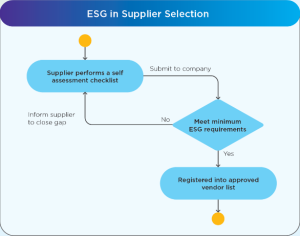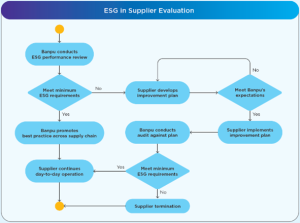

Significance & Commitment
Supply chain management plays an important role in driving the Company forward, as efficient supplier management not only reduces the risks of business interruption but also enhances operational efficiency. The Company is committed to promoting ESG principles across the supply chain, ensuring that environmental, social, and governance considerations are integrated into procurement practices and supplier engagement.
Management Approach
The Company announced the Sustainable Supply Chain Policy and published the Supplier Code of Conduct to ensure that all suppliers operate in alignment with ESG principles. The Company’s supplier management system is developed in alignment with international standards, such as ISO 20400. The Supply Chain Committee has been established to oversee supplier management, with a focus on strategic direction, performance monitoring, and capacity building across the supply chain.
The Kraljic Matrix method is employed for supplier segmentation process, prioritizing strategic and critical suppliers. This tool evaluates procurement value, interdependency, operational impact, and associated risks. More importantly, the Company promotes local procurement by seeking to source goods and services from suppliers in the locations where we operate.

As part of the long-term strategy, Banpu is systematically embedding ESG criteria into internal supplier-related standards. The approach includes conducting preliminary ESG risk assessment for all critical suppliers prior to the procurement, integrating ESG criteria into the supplier selection and onboarding process, and conducting annual ESG assessments for critical suppliers.
Two key standards are being established: ESG in Supplier Selection and ESG in Supplier Evaluation. Each standard includes a structured checklist that suppliers must complete to assess their ESG compliance before engagement and after service delivery. The criteria include social aspects such as health & safety and community impact, environmental aspects such as waste management, and governance aspects such as business ethics. The results from these assessments will play a crucial role in future procurement decisions, ensuring that suppliers continuously uphold responsible and sustainable practices.

Suppliers identified as high ESG risk are required to implement preventive measures and undergo comprehensive audits. The Company is committed to conducting annual audits to ensure ongoing compliance and proactively address emerging issues.
Download Related Document (PDF)
Chinese • English • Bahasa Indonesia
Japanese • Thai • Vietnamese

